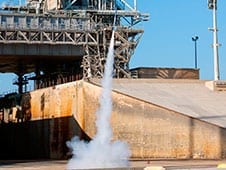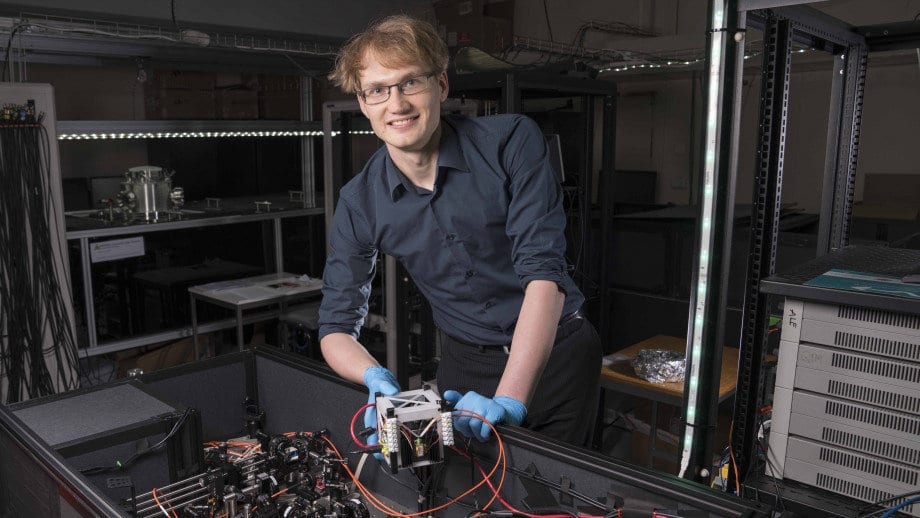
Rocket University is designed to develop, refine and maintain flight engineering skills
As NASA plans for future spaceflight programs to low-Earth orbit and beyond, teams of engineers at the Kennedy Space Center in Florida are gaining flight systems experience in designing and launching vehicle systems on a small scale.
As part of Rocket University, the engineers are given an opportunity to work a fast-track project to develop skills in flight systems through the life cycle of a program.
Four teams of five to eight members from Kennedy are designing rockets complete with avionics, separation and recovery systems. Launch operations require coordination with federal agencies, just as they would with rockets launched in support of a NASA mission.
“Rocket University began in the summer of 2010,” said Kevin Vega, assistant chief engineer for NASA’s Commercial Crew Program (CCP). “As the Space Shuttle Program was coming to an end, we realized many of our engineers were working systems designed long ago. ‘Rocket U’ was developed to help civil service and some contractor engineers expand their skill set, flight systems engineering experience and learn to manage design programs.”
Rocket University is designed to develop, refine and maintain flight engineering skills. The training program’s goals include developing and testing new technologies and potential ground-breaking systems through projects involving small scale vehicles. The effort also provides a fresh perspective to engineers who then take this hands-on expertise back into large-scale NASA programs, providing for more experienced, multi-disciplined systems engineers.
NASA is currently working in partnership with the nation’s aerospace industry in the Commercial Crew Program to develop space transportation systems to launch astronauts safely to the International Space Station. Also in the design stages are the Orion multi-purpose crew vehicle and the Space Launch System advanced, heavy-lift rocket to provide the capability for human exploration beyond low-Earth orbit.
Rocket University involves research and development in four platforms: rockets, unmanned aerial systems, weather balloons and the Neo liquid engine test bed.
“All these platforms have different training classes,” said Vega, who also is the Rocket University rocketry lead. “The students are assigned projects based on the platform they are working. In these cases, it’s done on a small scale with the full-scale project outline.”
The scaled-down projects allow the efforts to be completed over a period of months rather than years, as a full-scale system would require.
The Latest Bing News on:
Rocket University
- Hezbollah targets north in late-night barrage; IDF: 26 rockets were fired from Lebanonon April 27, 2024 at 7:21 pm
The head of the Anti-Defamation League accuses Democratic Representative Ilhan Omar of spreading a blood libel after she implied Jewish students who support Israel amid its war against Hamas are ...
- Rocket Launchers or Anti-Tank Mines? Helldivers 2 Players Must Vote to Unlock New Stratagems and Liberate Lacailleon April 27, 2024 at 10:08 am
Players of Helldivers 2 faced quite a choice in the new main command. Not only do the lives of citizens depend on their decisions, but also the reward they will receive for completing the task.
- SpaceX launching Falcon 9 rocket on record-tying 20th mission todayon April 27, 2024 at 3:01 am
It will be the 20th launch for this Falcon 9's first stage, according to a SpaceX mission description. That will tie a mark set earlier this month by a different Falcon 9 booster, on a launch of ...
- Kim Jong Un tested a new rocket that could hit Seoul — and may aid Russia against Ukraineon April 26, 2024 at 4:17 am
North Korea's leader, Kim Jong Un, oversaw the second set of tests for a new rocket that could be used to attack Seoul in South Korea and assist Russia in its war against Ukraine. The weapon is known ...
- Rockets for Schools to host rocket launch event in Sheboygan featuring NASA speakeron April 26, 2024 at 2:37 am
Students from Wisconsin, Michigan, Illinois, New Jersey, Pennsylvania, California and Kentucky will participate in the Secondary School Launch.
- North Korea leader Kim Jong Un inspects test-firing of multiple launch rockets, KCNA sayson April 25, 2024 at 3:23 pm
North Korean leader Kim Jong Un on Thursday inspected the test-firing of 240 mm multiple launch rockets manufactured by a newly established defence industry unit, the North's KCNA news agency reported ...
- Lego reveals NASA Artemis rocket, Milky Way galaxy sets coming in Mayon April 25, 2024 at 12:00 pm
New Lego sets explore 'the art of engineering excellence behind the human space missions to get a glimpse of what's out there.' ...
- Uhrig starts new adventure at Adams State Universityon April 24, 2024 at 5:00 pm
Brianna Uhrig signed her national letter of intent on Wednesday, April 24, to swim at Adams State University in Alamosa, Colorado. Get any of our free email newsletters — news headlines, sports, arts ...
- University of Florida professor to conduct research on Blue Origin space flighton April 24, 2024 at 10:19 am
A University of Florida professor will fly as part of a commercial space crew on an upcoming suborbital mission to conduct research, using a rocket by space flight company Blue Origin. Rob Ferl, ...
- World's most advanced solar sail rockets into spaceon April 23, 2024 at 9:00 pm
The world's most advanced solar sail spacecraft began its odyssey today at 23:32 GMT as it lifted off atop a Rocket Lab Electron launcher from Launch Complex 1 in Mahia, New Zealand. It was one of two ...
The Latest Google Headlines on:
Rocket University
[google_news title=”” keyword=”Rocket University” num_posts=”10″ blurb_length=”0″ show_thumb=”left”]
The Latest Bing News on:
Flight engineering skills
- CINEC Aviation is ready to take off to the futureon April 27, 2024 at 8:32 pm
Ltd is the largest, most diversified, and fastest growing non-state campus in Sri Lanka. Established in 1990 Enriched with ISO 9001:2015 Quality Management System Certification, CINEC was the winner ...
- Weather threat postpones Drillers' game Saturday night; Top Dodgers prospect Dalton Rushing returns to lineupon April 27, 2024 at 1:27 pm
Apr 27, 2024 Apr 27, 2024 Updated 54 mins ago 0 ...
- George Benson Reveals Release Date for Long-Lost Album Following Warner Music Group Returnon April 26, 2024 at 2:18 pm
Benson and composer-arranger Robert Farnon originally recorded Dreams Do Come True: When George Benson Meets Robert Farnon 35 years ago under the guidance of Grammy-winning engineer Al Schmidt. For ...
- AI takes the controls of a fighter jet to test its in-air combat skillson April 26, 2024 at 10:42 am
AI takes the controls of a fighter jet to test its in-air combat skills The US Army has tested various flight sequences entirely managed by artificial intelligence, including simulated combat. As part ...
- Tuskegee University announces new flight schoolon April 25, 2024 at 12:44 pm
Students at Tuskegee University can enroll in a comprehensive course that includes both classroom instruction and hands-on flight training.
- The Morning After: Testing the Rabbit R1's AI assistant skillson April 25, 2024 at 4:15 am
TikTok Lite axes ‘addictive as cigarettes’ reward-to-watch feature, Joe Biden signs the bill that could ban TikTok, JetBlue’s in-flight entertainment system just got a watch party feature.
- He missed a chance to be the first Black astronaut. Now, at 90, he's going into spaceon April 25, 2024 at 2:00 am
Edward J. Dwight Jr. is set to be on the next Blue Origin rocket into space. The rare opportunity comes more than six decades after he was passed over to become a NASA astronaut.
- Rising Star Kiyun Kim Elevates Accessibility at NASA Goddardon April 24, 2024 at 7:48 am
Once an intern, Kiyun Kim now flourishes as a software engineer and co-chair of an advocacy group at NASA’s Goddard Space Flight Center, promoting accessibility for all individuals. Name: Kiyun ...
- Future US Military Rotorcraft Design Capability At Riskon April 23, 2024 at 6:30 am
Sikorsky, a Lockheed Martin Company, announced on April 16 that it was cutting its staff by as many as 400 engineers.
- Skills shortage: what can be done right now?on April 23, 2024 at 1:33 am
If skills shortages weren’t desperate before the pandemic, they are now. Customer demand for flying continues to grow, and the whole system needs to be transformed to meet 2050 net zero carbon ...
The Latest Google Headlines on:
Flight engineering skills
[google_news title=”” keyword=”flight engineering skills” num_posts=”10″ blurb_length=”0″ show_thumb=”left”]











